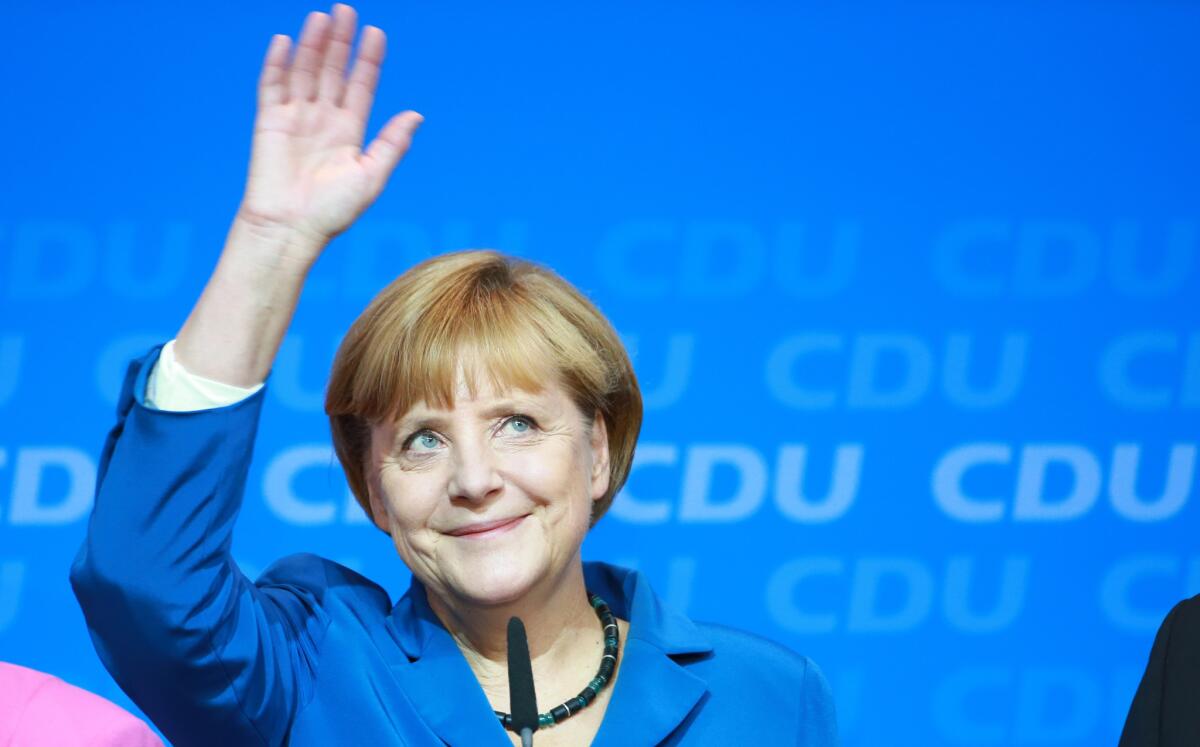Germany’s Merkel elected to third term as chancellor, exit poll shows

BERLIN — Angela Merkel appeared to have won a third term as chancellor in Germany’s elections Sunday, according to the first exit poll, but she faces tricky negotiations to form a coalition with the left-wing opposition after a surge in support for a new party opposed to Europe’s single currency.
The exit poll results, released by state broadcaster ARD after voting ended at 6 p.m., showed Merkel’s conservative Christian Democrats, or CDU, at 42%, leading the main opposition Social Democrats by 16 percentage points.
A new party founded in opposition to the euro, the Alternative for Germany, was polling at 4.9%, a whisker below the 5% threshold needed to enter the German parliament.
The results mean that Merkel, 59, is likely to serve a third four-year term as Germany’s chancellor.
The exit poll showed her current coalition partners, the Free Democrats, or FDP, at just 4.7%, too low to enter parliament. If that result holds, it would mean that the FDP, a liberal pro-business party, would drop out of the Bundestag for the first time in its history.
The FDP has been the kingmaker of German politics since the first post-war elections in 1949. But it has struggled as Merkel’s junior coalition partner. While the chancellor has claimed credit for Germany’s economic success, little of the FDP’s political program has been enacted.
Christian Lindner, a former general secretary of the party, told ARD that Sunday’s election marked “the most bitter hour since 1949” for his party.
The exit poll results, if borne out by the tally of actual ballots, would mean the CDU’s share of the vote was up eight percentage points from the 2009 elections. Ursula von der Leyen, the Christian Democratic employment minister, told ARD the outcome was “simply fantastic” for her party.
Projections based on the exit poll showed the Christian Democrats, or CDU, winning 299 seats in the 598-seat Bundestag, just short of an outright majority. The Social Democrats, or SPD, would have 183 seats, and their allies, the Greens, would have 58. Die Linke, a far-left party descended from East Germany’s Communists, would also have 58 seats.
The CDU is likely to seek a “grand coalition” with the Social Democrats — a black-red union in Germany’s color-coded political language — in order to form a stable government.
The SPD is expected to demand the introduction of a national minimum wage and an increase in the top rate of taxation as the price of its support for a coalition. Both policies are opposed by the CDU as harmful for job creation.
The SPD may also push for a softer line on the Eurozone crisis, including some means of jointly guaranteeing state debts across the single currency area.
Surveys show that Merkel’s cautious handling of the Eurozone crisis is strongly endorsed by the German public. After eight years in power, her approval ratings still regularly top 60%.
The chancellor has presided over a strong economy with low unemployment. She boasts of keeping Germany stable despite turmoil across the continent.
Her Social Democrat challenger, Peer Steinbrück, has accused her of prescribing a “deadly dose” of austerity for the Eurozone, saying the government’s crisis strategy lacks a “growth impulse.”
Germany’s new government will have to steer the country through a dramatic shift to renewable energy and cope with the needs of an aging population; census figures show Germany has more people at least 65 years old and it has children.
ALSO:
Suicide bomb attack kills 75 at Pakistan church
Israel reportedly helping Kenya in shopping mall siege
China court sentences former official Bo Xilai to life in prison
More to Read
Sign up for Essential California
The most important California stories and recommendations in your inbox every morning.
You may occasionally receive promotional content from the Los Angeles Times.










